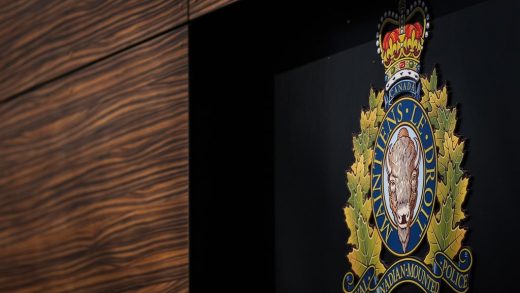‘They don’t let me feel limited’: Manitoba deafblind camp builds sense of community

HEADINGLEY — Craig MacLean and an interpreter are playing a game of shuffleboard in the rec room. After he excitedly slides the puck down the wooden table, the interpreter carefully draws a map of the board on his back with her index finger.
The tap of her finger on the small of his back signals MacLean has hit the target. He smiles with glee and slides another one down.
The modified game of shuffleboard is one of many ways Camp Manitou has been transformed for around 60 deafblind adult campers like MacLean this week.
RUTH BONNEVILLE / WINNIPEG FREE PRESS
Craig MacLean at Camp Manitou this week, organized by the Resource Centre for Manitobans who are Deaf-Blind.
The five-day camp, organized by the Resource Centre for Manitobans who are Deaf-Blind, is the only one of its kind in Canada. It returns after a two-year hiatus due to the COVID-19 pandemic.
Each participant is on a spectrum of both hearing and vision impairment. Attendees come from across the country to experience camp and make connections with those who have similar life experiences.
Aside from bringing the deafblind community together, Bonnie Heath, a co-organizer and the executive director of E-Quality Communication Centre of Excellence, said the goal is to make their experience as seamless as possible while also providing the necessary support.
It’s about making autonomy accessible.
“They come and they feel a sense of respect and a sense of independence,” Heath said. “That’s really why we created the camp.”
“They come and they feel a sense of respect and a sense of independence… That’s really why we created the camp.”– Bonnie Heath
The gathering thrives on a labour of love from its volunteers, who come from all corners of the country. One volunteer jetted in for the week from California.
“When they come here, it’s almost like a French immersion,” Heath explained. “You’re immersed in the deafblind culture for a week, everyone’s supposed to know how deafblind people function.”
At noon, there are around 30 people in the lunch room, but the sound level doesn’t reflect it. Tables of individuals, including kitchen staff, are communicating in American Sign Language, verbal English, tactile sign language and other forms of deafblind communication.
ASL is common among individuals who are deaf, but for those who are deafblind, different senses, like touch, must be engaged to get one’s message across, said Ellio Riggillo, a camp co-ordinator who hails from Toronto.
“We have a variety of deafblind individuals here, and so as a result, we’ve got a variety of communication methods,” Riggillo said. “Everything we do is tactile in terms of communication.”
RUTH BONNEVILLE / WINNIPEG FREE PRESS
Hand-over-hand signing.
One of them, called print on palm, is self-explanatory: the communicator draws individual letters of the alphabet to spell words out.
“H-e-l-l-o h-o-w a-r-e y-o-u-?” Riggillo draws with his index finger.
To communicate the sound of a laugh, Riggillo rapidly taps his fingers on the receiver’s forearm. Instead of saying LOL (laugh out loud), deafblind individuals say LOU, meaning “laugh on you,” to describe the literal, touch sensation.
“People come here and feel quite empowered and happy,” Riggillo said.
Outside the camp, life can be isolating for deafblind individuals. Ila Snare, who camps and co-ordinates the arts and crafts programming, said there aren’t many opportunities for deafblind people to socialize in the city.
“I feel isolated all the time at home. I step outside, and I feel I can’t get around properly without someone with me,” Snare said. “It’s really important to have support staff to be able to help me do the things that I need to do, do the things I want to do.”
“They understand my handicap, they understand my limitations, but they don’t let me feel limited.”– Ila Snare
But at Camp Manitou, just west of Winnipeg, campers are given the onus to communicate in the way that feels best to them, knowing others can respond the same way.
“They understand my handicap, they understand my limitations, but they don’t let me feel limited,” Snare said.
At the rock climbing wall, two campers who also happen to be a couple — Michael Stewart from Winnipeg and Bianca Martin from Brazil — are gearing up to brave the wall.
Martin and Stewart met through mutual friends and connected through Bible studies on Zoom. Soon, Stewart travelled to meet Martin in Brazil and join her in volunteering at the 2021 Deaflympics.
“It’s my very first time at the deafblind camp,” Martin said of her time at Camp Manitou. “Different deafblind individuals have different ways of communicating tactilely on the body.
RUTH BONNEVILLE / WINNIPEG FREE PRESS
Michael Stewart makes his way up the climbing wall during camp. For Stewart, who has been attending the camp since its first edition in 2018, it forms a sense of pride and connection.
“I’ve always done hand-over-hand, like sign language in the hand, but meeting a deafblind person that uses pro tactile, another communication method, has been really inspiring.”
Stewart climbs up the wall in no time. (Heath points out such structures are already tactile, making it easier for deafblind people to navigate.)
After reaching the ground, he unlocks his iPhone to type a message in large text: “Wrong shoes!!!!” — joking about the unsuitable pair of Crocs on his feet.
Rock climbing, swimming, archery and more are all made possible for deafblind individuals at Camp Manitou. Though many cannot hear sounds or see the sights, memories are made through the refreshing sensation of swimming on a hot summer day, the smell of cedar fills the grounds and the laughter experienced not through sound, but through touch, advocates said.
Though the camp is only five days, the experience resonates with attendees long after they leave the grounds. For Stewart, who has been attending the camp since its first edition in 2018, it forms a sense of pride and connection.
“I feel like I’m at home. It’s my community, and so I love coming to be with them and building relationships with everybody,” he said.
Credit: ‘They don’t let me feel limited’: Manitoba deafblind camp builds sense of community


